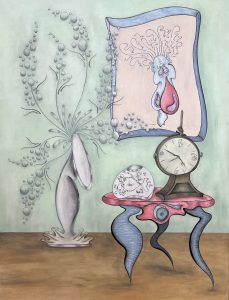When you board an elevator, do you face towards the door or the back wall?
You face the door. Everyone faces the door. It’s anticipated.
But what if you decide to face the back of the elevator? What if you turn to face all the other people in the elevator?
Social faux fas, oui?
And an example of what communication theorists call an expectancy violation.
Expectancy Violations Theory (EVT) is an interpersonal communication theory that recognizes humans have nonverbal behavioral expectations. We deem violations of those expectations as positive or negative. This is one of my favorite theories because it plays out in the real world — and is quite useful in altering others’ perceptions.
I’ll discuss nonverbal communication in depth next month in my Communication Keys column. But you probably know that nonverbal communication includes proxemics: how humans share space. Like, for example, the distance you are comfortable standing next to a stranger. Or how you mark your chair with your sweater so others know you are sitting there. (A sweater is preferable to urine, but the action is a similar marking. Bet that side comment woke you up!)
Some of these nonverbal behaviors are those we expect as normal for that context. For example, if your friend always holds a door open for you, you anticipate that behavior. Those expected actions are predictive and change with culture and time. Other types of expected behaviors are prescriptive: nonverbal actions predicted based on context. If you approach a coffee bar counter, you expect a barista to ask for your order.
Films, shows, and stories use this theory — typically for comedic purposes. Remember church tongue in The Wedding Singer? The two brothers interviewing as a team — in tuxedos — in Step Brothers? The Close Talker in Seinfeld.
Societal behaviors, like maintaining social distance when speaking to others or when facing the front of the elevator, are predictive. I know you can rattle off a list of them:
- If you place your hoodie on the back of a chair at a meeting, you expect your space to be your space when you return from the bathroom. Someone sitting in that spot would be an expectancy violation.
- If you are sitting alone in an empty dining hall or restaurant, you expect the second person to enter the establishment to sit at a distance. (Keeping our personal space bubble.) Someone sitting right next to you would be an expectancy violation. Alternatively, in a crowded bar, we expect people to be close to all belly up to the bar. In that situation, a person holding two feet to either side is an expectancy violation (note to the roid-head at the bar the other night — the whole left side of the bar is not yours.)
- When you board an elevator, you and the other occupants provide social privacy and face the doors. If a person faces the other occupants with her back to the doors, we would think her unstable, or even dangerous.
- A professional speaker will use appropriate terms and will not curse. And certainly will not walk around the room touching the audience members! Cursing or touching would be shocking.
- Your boss does not hug you when you arrive or leave work. We even have laws to enforce that particular expectancy. A kiss on either cheek may be acceptable in parts of Europe, but not in the United States. (Note the cultural and contextual differences.)
- When attending an interview, we wear professional clothing. In fact, clothing has strong contextual connections.
- We do not stare at strangers at the coffeehouse. Again, if a stranger is staring at you, you will feel threatened or, at the very least, uncomfortable.
Theorist Judee K. Burgoon proposed that responses to others’ violation of nonverbal expectations depended on if the violator was liked or not. This was a revolutionary insight. If we like the person, the violation will cause increased liking. If we do not like or do not know the person, the violation will probably result in a dislike of the perpetrator. So, in contradiction with what you would expect, violations can have desirable results.
Liking includes our evaluation of the person’s communication style (friendly, aggressive, joking or playful) or the attractiveness of that person. It can include the person’s gender, sex, age or ethnicity. We may evaluate the person’s status or the formality of the situation. We evaluate the purpose of the interaction in that context. We evaluate the availability of space — like other seating or space at the bar. We consider if we know that person, had prior interaction with that person, or trust that person due to experience or title.
Let’s look at some examples. What is your reaction to:
- You placed your hoodie on the back of the chair and when you return from the bathroom: (a) the person you have been trying to date is sitting there with a smile, (b) your significant other is sitting there, (c) a stranger is sitting there.
- You’re alone in a restaurant and sitting at a corner table. A new patron enters and sits at your table. How do you react if it’s: (a) your friend; (b) an acquaintance from work; (c) a famous person; (d) it’s a stranger who is professionally dressed; (e) it’s a stranger who is obviously homeless?
- You’re in a crowded bar and barely able to squeeze up to call the bartender over. A stranger pushes against your back and ass and leaves after getting a drink. Or you’re in the same crowded bar situation and that stranger places a hand on your ass. And doesn’t take it away. Or the bar is empty, and a stranger pushes up against you. Notice your anticipated reaction.
- The person boards the elevator and faces the other occupants. How do you react if the person is a stranger but: (a) funny and making jokes about riding slow elevators; (b) attractive; (c) intoxicated?
- You attend a workshop and the speaker drops F-bombs. Does your reaction change if: (a) you are a fan of this speaker; (b) you know this speaker’s style and anticipated the speech; (c) don’t agree with the speaker?
- After you disclose a death in the family, your boss hugs you and expresses sympathy as you are leaving work and (a) you’ve known your boss for over 10 years; (b) you and your boss are friends; (c) you dislike your boss; (d) your boss is known for inappropriate touching.
- You are about to interview a list of new hires. How does your evaluation change to a person wearing ripped jeans and a tee shirt? (a) The person is applying as a stock broker; (b) the person is applying as a mechanic; (c) the person is applying as a nanny?
- You raise your head and notice the person across the coffeehouse is staring at you. How do you feel if: (a) the person is attractive; (b) the person is unattractive; (c) the person is much younger or older; (d) the person is an ex.
You cannot consult some etiquette tome to learn these rules (although you can learn about the rules through academic papers). No, as a polite member of the society in which you live, you must learn the unspoken rules. And once you know the theory and its effects, you have a responsibility to evaluate your reaction to others’ violations and to take care with and understand the impact of your own violations. You can also begin to appreciate cultural differences and will be less shocked when visiting your Italian cousin who kisses you repeatedly!
As an interesting side note, EVT research has expanded into the area of CMC: Computer Mediated Communication. Even in asynchronous contexts, like email, social media or server conversations, participants have expectancies subject to the same rules.
Ever get a friend request from a stranger? Don’t you note if that person seems desirable (attractiveness, age, contacts) or if that person has mutual friends?
How do you feel when a friend has too many status updates? Doesn’t your judgment of too many depend on how much you like that person? Or how about the friend who posts TMI (too much information) every time? (Note: Friends who I no longer follow. (a) I do not want photos of evidence you have the flu or (b) your diatribe about the should-be-private reasons why we should unfriend your now ex.)
We don’t post pictures that would embarass another. We don’t write emails in ALL CAPS. We don’t — or shouldn’t — post items to another wall that the person would not want there. And when responding, high-status individuals are deemed more powerful for delay — but low-status individuals are judged harshly for delay.
Unfriending and listing another as your partner are also bound by expectancies. This particular area is why I wrote this article. My husband and I were very careful about adding each other as partners — considering how others interpret that status. We did not make the relationship Facebook Official until we were ready — and until we had gotten comfortable with our partner’s families and children. However, the day we were married, we updated our statuses. People expected it, yes?
A few weeks ago, hubby decided to jump the social media ship. He deleted all his profiles. So, in social dippy world, I’m married to no one. And… the texts and calls to me began. Are you guys okay? Is he okay? Are you divorcing? It was amazing. We both laughed at the uproar his decision caused.
Consider your expectations — and the expectations of others. With simple awareness, you can improve your communication — and use planned violations to increase others’ liking for you!



